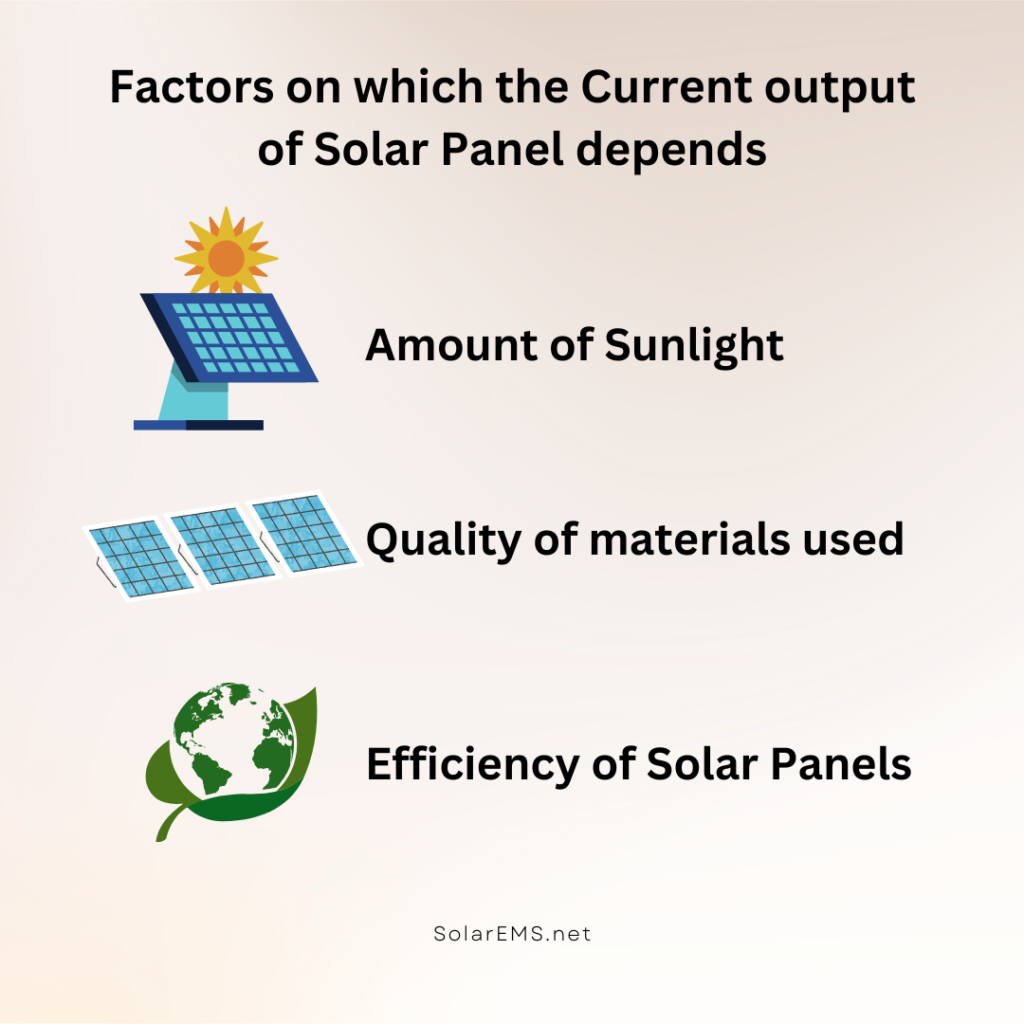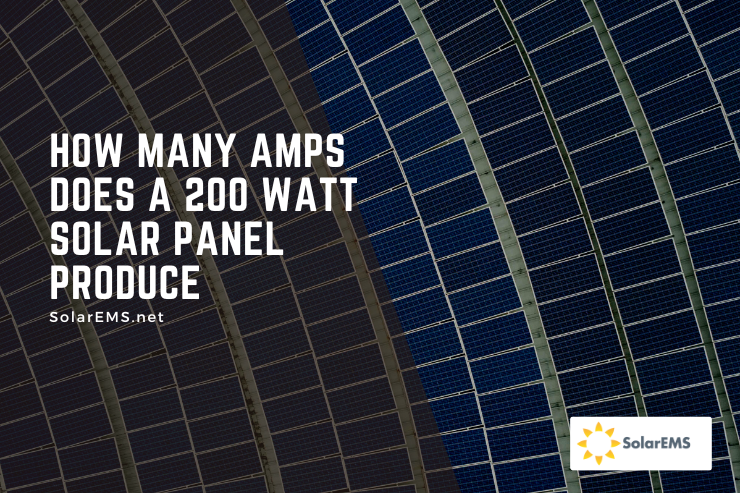The world is slowly turning towards green or renewable energy. To contribute to the environment, many people have started to think about installing solar panels in their homes and offices. In case you are thinking about the same and have done your research you may wonder how much current or amps does a 200-watt solar panel provide and whether it will be sufficient for your household energy requirements or not.
If you are concerned about installing solar panels then look no further because, in this article, we will discuss how many amps a 200-watt solar panel produces and what things you can run on the same so that you can determine if it is going to be sufficient for supporting your home’s daily energy needs.
If we were to offer you a very simple answer (to the above-mentioned question) then that would be that 200-watt solar panel amps can generate 10 to 12 amps of power in a single hour which means you will be able to receive around 60-70 amps of electricity every single day. Although the way it is stored, and the load on the solar panels will be a factor in deciding the output.
Nevertheless, you also need to understand that the above-mentioned figure is an average figure and the amount of electricity you will receive or generate through your solar panels may depend on various factors including your solar system, peak sunlight hours, etc. So I will offer you a broader understanding of what can a 200-watt solar panel power do in this article.
What is the significance of Amperage in a solar panel?
The amperage of a solar panel is an important factor in calculating the panel’s power output. The amperage, measured in amperes (A) or “amps,” is the amount of electrical current that a solar panel can produce.
The current produced by a solar panel is directly proportional to the amount of sunlight it receives, so a higher amperage rating means that the panel can generate more power in bright sunlight. However, the voltage output of a solar panel also affects its power output (W), so it is important to consider both amperage and voltage when evaluating a panel’s performance.
The power output of a solar panel can be calculated as:
Power Output (W) = Voltage Supplied by Solar Panel (V) x Current Produced by Solar Panel (A)
Additionally, the amperage rating of a solar panel is important when selecting other components of the solar power system, such as the charge controller and inverter. These components must be matched to the amperage of the solar panel to ensure efficient and safe operation of the system. It is crucial to check the max current output of the solar panel because if you use other electrical equipment like switches and wires rated for a lower current capacity, there will be a very high risk of overheating and eventually fires.

In summary, the amperage of a solar panel is significant because it helps determine the panel’s power output which is an important factor in selecting other components of the solar power system.
So, let us assume while searching for solar panels you come across a panel that has 15 amps written on it, that means that the particular panel can produce 15 amps of electricity every hour it receives sunlight. By this, you will be able to know exactly how many solar panels you will require for your household.
Number of Amps produced by a 200W Solar Panel
Usually, 100 watts solar panels can generate 5 amps to 6 amps of electricity in one hour based on the intensity of the sunlight therefore you can receive almost 10 amps to 12 amps of sunlight from a 200 watts solar panel.
Now if you look at the average sunlight exposure then most of the places normally get at least 6 hours of sunlight which means that a 200 watt solar panel can at least output 60 (10*6 = 60 A) every day (theoretically or mathematically).
However, in this scenario, you also need to note that if the generated electricity is not being used in your household or to charge batteries then it will become lost. Do you want to know the reason? It is simply because solar panels cannot store electricity.
If you do not want the electricity to be lost then you have two options. You can either buy and install inverter and batteries with your solar panels which will store the electricity (until it reaches its full capacity) or you can also opt for an on-grid or grid-tied solar system which will transfer your excess electricity to the nearest electrical grid and save you a lot of money in the long run.
The exact size of a 200-watt solar panel
Before installing a 200 watts solar panel it is important to know its average dimensions. You won’t have to get out of your way to research this information because we can help you out here as well. To be honest, the exact size of a 200 watts solar panel differs between manufacturers and the specific model as it heavily depends on the quality of material used to manufacture the solar panels, the efficiency of solar cells, the total amount of cells in the solar panels, as well as the specific design and construction of the panel itself. Therefore, it is always a good idea to check the specifications provided by the manufacturer to determine the exact dimensions of a particular 200 watt solar panel etc.
However, as a general estimate, a 200 watt solar panel typically has dimensions of approximately 66 inches by 40 inches (1676mm x 1016mm), with a thickness of around 1.4 inches (35mm).
The above measurements are very common and have been regarded as the industry standard however the manufacturers use materials like glass, EVA plastic, back material for the panel, etc. which is why the specifications of the panels are different. You also need to note that an average 200 watts solar panel can weigh between 11 kg to 12 kg.
What will impact how many amps a 200W solar panel can produce?
As previously explained mathematically how much amps of electricity a 200W panel can generate, in reality, multiple factors can determine the productivity of the 200 watts solar panel.
On average, it may become possible to produce 10 or 12 amps of electricity but the number won’t be consistent because there are lots of things that can influence energy production. Some of the major influencing factors are discussed below:
- The quality of the solar panels matter. Less expensive solar panels sometimes are not efficient enough to generate a good amount of electricity, which is why it is better to check the quality of solar panels at the time of purchase.
- One of the key influencers for generating electricity in the 200 watts solar panel is the exposure to sunlight. If your solar panels are receiving ample sunlight during the day then you will be able to generate the maximum amount of electricity every hour. However, you also need to note that if the sky remains cloudy then you won’t be able to use your solar panels to the fullest extent.
How many solar panels will you require for household usage
Probably, one of the major reasons why you are researching about 200-watt solar panels and how many amps is because you want to know if it is going to generate enough electricity to handle your household’s daily energy usage.
As a rough estimate, a typical residential solar system in the United States ranges from 3 kW to 8 kW, and it usually requires around 12 to 28 solar panels, assuming each panel has a wattage of 250-350 watts. However, the exact number of solar panels needed for your household will depend on your specific energy needs and other factors mentioned above. So be sure to consult an expert beforehand.
However, a 200 watts solar panel can take care of some household appliances. If you want to install a solar system then you should conduct thorough research on your monthly and yearly electricity usage. For starters, you should individually check the following appliances since they consume the most electricity
- Fridge
- Water heating system
- Air Conditioner
After that, you should check on the following instruments to get an approximate number
- Microwave
- Induction
- Light
- Fan
- Mobile
- Laptop
- Television
If you have calculated your total energy consumption then you can proceed further to purchase and install a solar system that will be sufficient for providing enough electricity to the following appliances.
Final words
If you were to ask the question of 200-watt solar panel how many amps then the answer would be a minimum of 10 amps per hour in an ideal condition. If the peak sunlight hours in your region or locality is 6 hours then your solar system will be able to produce 60 amps every single day.
Now if you have a battery system attached to your solar system then you can use some electricity for your household and then the rest of it can be stored in your battery. You can ask what to do if my daily household electricity consumption is high. Well, in that case, you should simply install a solar panel that is bigger or better than the size of a 200-watt solar panel.
Frequently asked questions
How many batteries can a 200-watt solar panel charge?
The number of batteries that can be charged with the help of a 200-watt solar panel charge will depend on the overall capacity and the type of battery. For example, if your battery capacity is 100 Ah then it will take 2.5 hours to charge every single one of them.
During 7.5 hours of direct sunlight on a sunny summer day, a 200-watt solar panel can recharge three 100AH batteries, two 150AH batteries, or one 300AH battery.
Will a 200-watt solar panel charge a 200Ah battery?
Although it is possible to charge a 200Ah battery using 200-watt solar panels, it will consume a significant amount of time. For a 12V 200Ah lead acid battery to be recharged in 5 peak sun hours, around 520 watts of solar panels are needed.
Can a 200-watt solar panel run a refrigerator?
Yes, you can easily use a 200-watt solar panel to run a refrigerator because a 12V fridge requires only 150-watt solar panels. This means you will have enough energy to run your refrigerator and also spend the extra electricity on other electric appliances available at your home.
Will a 200-watt solar panel run a TV?
If you have only small appliances in your home then it is perfect to use a 200-watt solar panel. You can run a couple of laptops, LED lights, microwaves, coffee makers, mini projectors, LCD TVs, etc. if you install a 200-watt solar panel.
What kind of battery is needed for solar panels?
The batteries used to store electricity generated from solar panels are usually lithium-ion batteries. Although batteries such as saltwater batteries and lead acid batteries are more affordable, they won’t be able to offer the qualitative aspect of a lithium-ion battery.
In this article, we have covered all the possible aspects regarding 200-watt solar panels, why it is important to know about your electricity consumption before installing the 200-watt solar panels, how much electricity 200-watt solar panel can produce in a single day, etc. so that the users can receive all the important information and apply the same while installing a solar panel.


